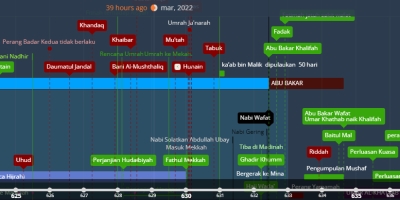jun 17, 656 - Rumah Uthman dibakar
Description:
17 jun 656Uthman Ibn Affan, the third Rashidun caliph, was assassinated at the end of a siege upon his house in 656. Initially a protest, the siege escalated following the death of a protester. The protesters turned rebels had demanded a new caliph, but Uthman refused and on June 17, 656 (35 AH), as his house was set alight, some protestors were able to jump to the back of his house, where they found him reading the Quran. They gave him a blow over the head and pierced him through his stomach.
Uthman's death had a polarizing effect in the Muslim world at the time. Questions were raised not only regarding his character and policies but also the relationship between Muslims and the state, religious beliefs regarding rebellion and governance, and the qualifications of rulership in Islam.[1]
Concerning the events which led to siege of Uthman, Wilferd Madelung writes: 'Uthman ibn 'Affan expressed generosity toward his kin, Banu Abd-Shams, who seemed to dominate him, and his supposed arrogant mistreatment toward several of the earliest companions such as Abu Dharr al-Ghifari, Abd-Allah ibn Mas'ud and Ammar ibn Yasir provoked outrage among some groups of people. Overt resistance arose in 650–651 throughout most of the empire.[2] The dissatisfaction with his rule and the governments appointed by him was not restricted to the provinces outside Arabia.[3] When Uthman's kin, especially Marwan, gained control over him, the noble companions, including most of the members of elector council, turned against him or at least withdrew their support, putting pressure on the caliph to mend his ways and reduce the influence of his assertive kin.
Added to timeline:
Date:
jun 17, 656
Now
~ 1369 years ago
